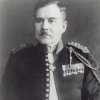He was born and raised in Split (while it was still under Austro-Hungarian rule), and subsequently attended the Merchant Academy and later, the Royal Gymnasium, both for two years. In 1913, Cukela emigrated to the United States and, with his brother, settled in Minneapolis, Minnesota.
On September 21st, 1914, he enlisted in the U.S. Army. Three years later, on January 31st 1917, with war raging in Europe, he enlisted in the U. S. Marine Corps. Following the United States' entry into the conflict, he went to France and fought alongside his servicemen in the 5th Marines.
.He was awarded both Medals of Honor for the same action near Villers-Cotterets, France, on the morning of July 18th, 1918, during the Soissons engagement. The 66th Company, 5th Marines, in which Cukela was then a gunnery sergeant, was advancing through the Forest de Retz when it was held up by an enemy strong point. Despite the warnings of his men, he crawled out from the flank, advanced alone towards the German lines and demolished the remaining portion of the strong point from the shelter of a nearby gun pit.
In addition to the two Medals of Honor, Major Cukela was awarded the Silver Star by the Army; the Medaille militaire (he was the first Marine officer ever to receive this medal), the Legion d'honneur in the rank of Chevalier, the Croix de guerre with two palms, another Croix de guerre with silver star, all by France; the Croce al Merito di Guerra by Italy; and Commander's Cross of the Royal Order of the Crown of Yugoslavia. He also received three Second Division citations.
Major Cukela received a field appointment to the rank of second lieutenant in the Marine Corps Reserve on September 26th, 1918 and was selected for a commission in the regular Marine Corps on March 31st, 1919. Promoted to first lieutenant on July 17th, 1919, he was advanced to the rank of captain on September 15th, 1921. His promotion to major was effected on the day of his retirement, June 30th, 1940. After the war, Major Cukela served on overseas bases in Haiti, Santo Domingo, the Philippines, and China, and at domestic stations in Quantico, Virginia; Philadelphia, Pennsylvania; Norfolk, Virginia; Hampton Roads, Virginia; Mare Island, California; Washington, D.C.; Nashville, Indiana, and Fort Knox, Kentucky.
On the 19th of March, 1956, Major Cukela died at the U.S. Naval Hospital, Bethesda, Maryland. Following services at St. Jane Frances de Chantel Church, Bethesda, he was buried with full military honors in Arlington National Cemetery, March 22nd, 1956.
His citation from the Navy reads:
For extraordinary heroism while serving with the 66th Company, 5th Regiment, during action in Forest de Retz, near Viller-Cottertes, France, 18 July 1918. Sgt. Cukela advanced alone against an enemy strong point that was holding up his line. Disregarding the warnings of his comrades, he crawled out from the flank in the face of heavy fire and worked his way to the rear of the enemy position. Rushing a machine-gun emplacement, he killed or drove off the crew with his bayonet, bombed out the remaining part of the strong point with German hand grenades, and captured two machineguns and four men.
His Army citation reads:
When his company, advancing through a wood, met with strong resistance from an enemy strong point, Sgt. Cukela crawled out from the flank and made his way toward the German lines in the face of heavy fire, disregarding the warnings of his comrades. He succeeded in getting behind the enemy position and rushed a machinegun emplacement, killing or driving off the crew with his bayonet. With German hand grenades he then bombed out the remaining portion of the strong point, capturing 4 men and 2 damaged machineguns.





